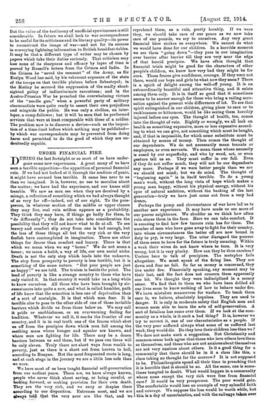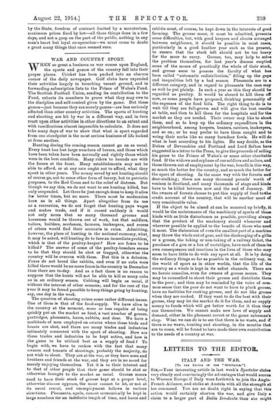UNDER FINANCIAL FIRE.
DURING the last fortnight or so most of us have under- gone some new experiences. A great many of us have seen a terrible apparition—the apparition of personal financial rain. If we had not looked at it through the medium of panic, it might have seemed less terrible. It came less near to us than we imagined. It is, however, no use to moralize about the matter ; we have had the experience, and our knees still tremble. We saw as men see when they are deceived by a mirage, a reflection of something which we had always thought of as very far off—indeed, out of our sight. To the pros- perous, in whatever section of the middle or upper classes they may live, real ruin seldom appears as a probability. They think they may have, if things go badly for them, to "do differently "; they do not take into consideration the possibility that they will not know what to do at all. To see luxury and comfort slip away from one is bad enough, but the loss of these things all but the very rich or the very foolish have contemplated in imagination. There are other things far dearer than comfort and luxury. There is that which we mean when we say " home." We do not mean a house ; we mean a habit, a way of life, our own social niche. Death is not the only step which leads into the unknown. The step from prosperity to poverty is less terrible, but it is something' of the same nature. " But poor people are just as happy !" we are told. The truism is beside the point. The land of poverty is like a strange country to those who have only visited it. In that country it would take us a long while to know ourselves. All those who have been brought by cir- cumstances into quite a new, and what is called humbler, path of life know that the sensation is less one of deprivation than of a sort of nostalgia. It is that which men fear. It is terrible also to pass to the other side of one of those invisible barriers which divide us from those below us. We may call it pride or snobbishness, or an overweening feeling for tradition. Whatever we call it, it marks the frontier of our country, and it is in real truth one of the fences which shut ue off from the precipice down which men fall among the seething mass where hunger and squalor are known, and where men are fighting for life. There may be a dozen barriers between us and them, but if we pass one there will be only eleven. Truly there are short ways from wealth to poverty, just as there is a short cut from heaven to hell, according to Bunyan. But the most frequented route is long, and at each stage in the journey we are a little less safe than we were.
We have most of us been taught financial self-preservation from our earliest years. There ate, we have always known, people who never think about saving, or being careful, or looking forward, or making provision for their own death. They are the very rich, and we envy or despise them according to our disposition. Extremes meet, and we are always told .that the very poor are like that, and we reprehend them, as a rule, pretty harshly. If we were they, we should take care of our pence as we now take care of our pounds, we say to ourselves. Any very great financial blow strikes us everywhere. We cannot do what we would have done for our children. In a horrible moment we see them " going down "—they pass in onr imagination over barrier after barrier till they are very near the edge of that horrid precipice. We have often thought that financial trials might be good for the characters of other people's children, we know how very bad they might be for ours. Those fences give confidence, courage. If they were not there, would our boys and girls be what now they seem P There is a spirit of delight among the well-off young. It is an extraordinarily beautiful and attractive thing, and it exists among them only. It is in itself so good that it sometimes seems to be answer enough for those who bring a railing accu- sation against the present wide differences of lot. To see that spirit extinguished in our children, giving place to care or to recklessness or bitterness, would be like seeing them horribly injured before our eyes. The thought of health, too, comes into the thought of ruin. Rightly or wrongly, we all look on health as something expensive, more or less expensive accord- ing to what we can give, not something which must be bought, and, if that is impossible, for which some substitute must he obtained by means of money. Then comes the thought of our dependants. We do not necessarily mean tenants or employees, or even servants. We mean those whose necessity is eased by our superfluity, and who by word, act, or even gesture tell us so. They must suffer in our fall. Even if they do not suffer much, they will not be our dependants any more. Perhaps if we were better people than we are we should not mind; but we do mind. The thought of "beginning again" is in itself terrible. To do a young man's work, without the long vista of hope which makes a young man happy, without his physical energy, without his spur of natural ambition, without the backing of the last generation—truly we have just come out from a very bad dream.
Perhaps the pomp and circumstance of war have led us to another new experience. It may have made us see more of our poorer neighbours. We shudder as we think how often ruin stares them in the face. Here we can take comfort. It is amazing to find how few terrors ruin has for them. The number of men who have gone away to fight for their country, into whose circumstances the better off are now bound in duty to pry, is very large. The utter disregard the poorest of them seem to have for the future is truly amazing. Within a week their wives do not know where to turn. It is very wrong, but it is very plucky. How can they be thus careless ? Useless here to talk of precipices. The metaphor fails altogether. We must speak of the firing line. They are down and fear no fall. So far as money is concerned, they live under fire. Financially speaking, any moment may be their last, and the fact does not concern them apparently one bit. We thought they were indisciplined in a money sense. We find that to them we who have been drilled all our lives seem to know nothing of how to behave under fire. We have mistaken manoeuvres for warfare. To teach them care is, we believe, absolutely hopeless. They are used to danger. It is only in moderate safety that English men and women seem able to learn the arts of self-preservation. A sort of fatalism has come over them. If we look at the com- munity as a whole, is it such a bad thing? It is, however we try to correct it, one of our characteristics as a people. If the very poor suffered always what some of us suffered last week, they would die. Do they love their children less than we ? We dare not make such a suggestion. But Christianity and common-sense both agree that those who love others love them as themselves, and those who are not anxious about themselves are not very anxious about others. Is it a good thing for a community that there should be in it a class like this, a class taking no thought for the morrow ? It is not supposed to be. Philanthropists spend all their time in preaching that it is horrible that it should be so. All the same, one is some- times tempted to doubt. What would happen in a community where none except the very rich were free from financial care ? It would be very prosperous. The poor would gain. The comfortable would lose an example of very splendid faith and courage. We suppose the loss would be worth while, but this is a day of uncertainties, and with the railways taken over
by the State, freedom of contract limited by a moratorium, maximum prices fixed by law—all these things done in a few days, and not a gasp on the part of the public, nothing in any man's heart but loyal co-operation—we must come to doubt a great many things that once seemed sure.



































 Previous page
Previous page